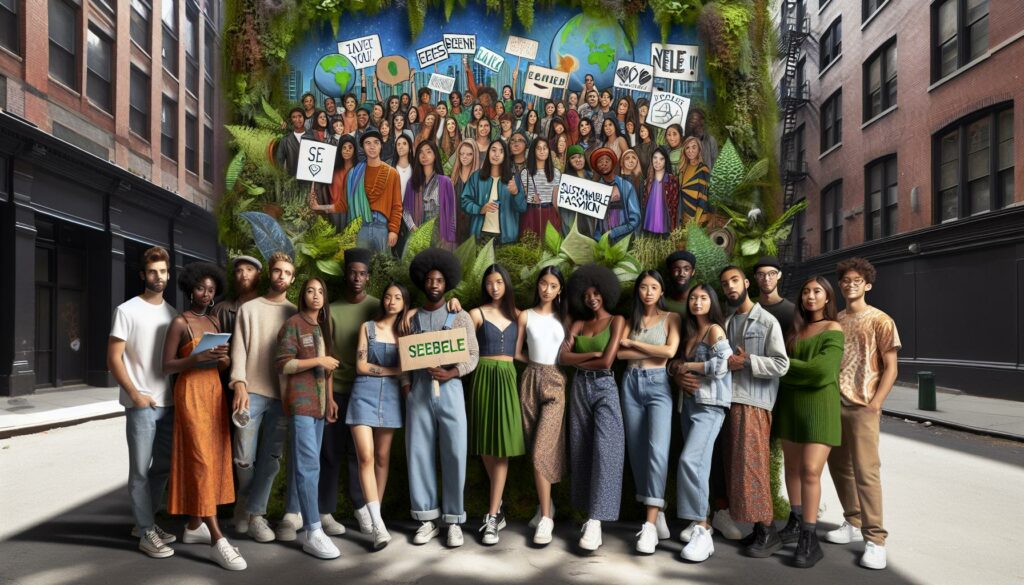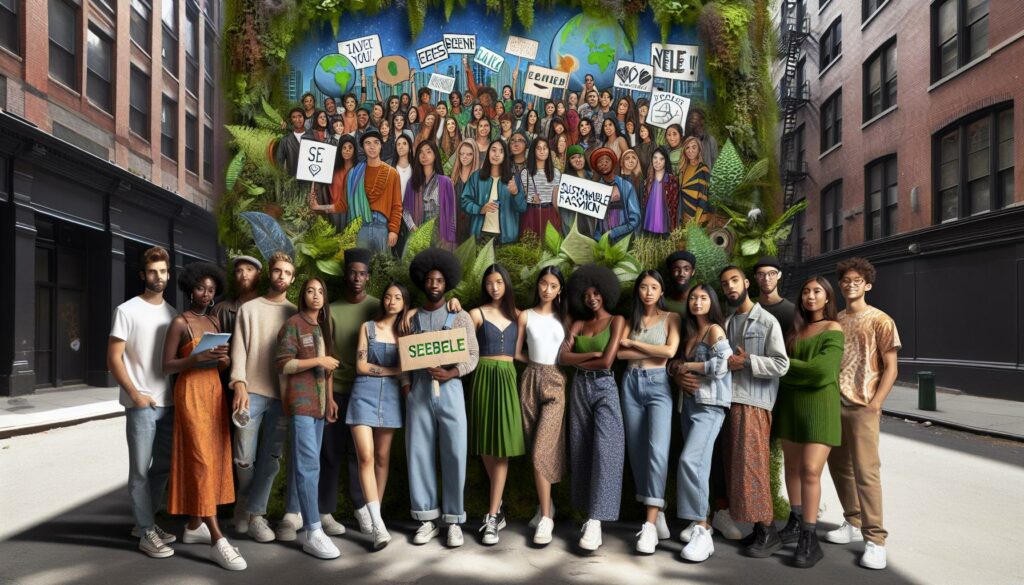Fashion’s impact on the environment is staggering, and it’s time we rethink our choices. As consumers become more aware of sustainability, a wave of organizations is stepping up to lead the charge in sustainable fashion. These groups are not just about eco-friendly materials; they’re redefining the entire industry by promoting ethical practices and transparency.
I’ve seen firsthand how these organizations are making strides to create a more responsible fashion landscape. From innovative recycling methods to fair labor practices, they’re proving that style doesn’t have to come at the expense of the planet. Join me as I explore some of the most influential sustainable fashion organizations that are paving the way for a greener future.
- Significant Environmental Impact: The fashion industry significantly affects the environment, necessitating a shift towards sustainable practices to mitigate harm.
- Role of Sustainable Organizations: Organizations like Fashion Revolution and The Good Trade lead efforts in promoting transparency, ethical labor practices, and eco-friendly materials in fashion.
- Consumer Awareness: Many consumers remain unaware of the sustainable fashion movement, highlighting the need for increased education and awareness.
- Challenges in Implementation: Sustainable fashion organizations face challenges, including resistance from established brands and the complexities of maintaining sustainable supply chains.
- Social Responsibility: A commitment to fair labor practices and transparency is crucial for creating a more equitable and ethical fashion industry.
- Empowering Consumer Choices: Consumers can support sustainable fashion by making informed choices, researching supply chains, and opting for ethical brands and practices.
Sustainable Fashion Organizations
Sustainable fashion organizations focus on reducing the environmental impact of the fashion industry. They prioritize eco-friendly materials, ethical labor practices, and transparency. These organizations advocate for more responsible consumption and aim to educate consumers about the importance of sustainability in fashion.
Key Organizations
- Fashion Revolution: Focuses on transparency in the fashion supply chain. It promotes awareness of workers’ rights and sustainable practices.
- The Good Trade: Curates ethical brands, providing consumers with sustainable shopping options. It covers topics like sustainable living, ethical fashion, and wellness.
- Eileen Fisher: Embraces a circular economy approach. The brand prioritizes organic materials and offers a take-back program for recycling old clothing.
- The Apparel Impact Institute: Works with brands to implement sustainable practices. It provides resources to track and reduce carbon footprints in the apparel sector.
- Sustainable Apparel Coalition: Aims to unify the apparel, footwear, and textiles sectors to improve sustainability. It promotes measurement tools like the Higg Index to assess environmental impacts.
Impact on the Industry
Sustainable fashion organizations greatly influence industry dynamics. They encourage brands to adopt greener practices and provide consumers with sustainable choices. Their work leads to more eco-conscious shopping habits, pushing the fashion industry towards accountability and environmental stewardship.
Challenges Facing Organizations
These organizations face several challenges, including:
- Consumer Awareness: Many consumers remain unaware of the benefits of sustainable fashion.
- Industry Resistance: Established brands often resist implementing sustainable practices due to cost concerns.
- Supply Chain Complexities: Evaluating and maintaining sustainable supply chains presents logistical challenges.
Sustainable fashion organizations play a critical role in transforming the fashion landscape. Their commitment to ethical practices and environmental responsibility helps shape a more sustainable future.
Key Principles of Sustainable Fashion
Sustainable fashion revolves around minimizing negative impacts on the environment and promoting social equity. These principles guide organizations in their mission to create a more responsible industry.
Environmental Impact
Reducing environmental harm remains a primary focus in sustainable fashion. Organizations prioritize eco-friendly materials, such as organic cotton, Tencel, and recycled fabrics. They encourage brands to utilize sustainable processes, including water-efficient dyeing and minimal waste production. For instance, many brands now implement closed-loop systems that recycle materials into new products, significantly cutting down on landfill contributions. These practices demonstrate a commitment to preserving natural resources and mitigating pollution.
Social Responsibility
Social responsibility plays a vital role in sustainable fashion. Organizations advocate for fair labor practices, ensuring workers receive fair wages and safe working conditions. They promote transparency by urging brands to disclose their supply chains, allowing consumers to make informed choices. Companies like Eileen Fisher exemplify this principle by supporting local artisans and investing in community development programs. This approach not only uplifts marginalized communities but also fosters a more ethical fashion landscape.
Notable Sustainable Fashion Organizations
Sustainable fashion organizations play an essential role in promoting eco-friendly practices and ethical standards within the fashion industry. Below are key organizations making significant contributions.
Fashion Revolution
Fashion Revolution focuses on transparency and social justice in the fashion supply chain. The organization encourages consumers to question where their clothes come from and advocates for better working conditions for garment workers. They host the annual Fashion Revolution Week, which raises awareness about the impact of the fashion industry and promotes sustainable brands through educational campaigns.
The Good Trade
The Good Trade curates a list of ethical brands, emphasizing organic, sustainable, and fair trade practices. The organization provides resources for conscious consumers, including articles on sustainable living and guides to minimalism. Their commitment to promoting ethical fashion empowers consumers to make informed choices that align with their values.
Eileen Fisher
Eileen Fisher, a fashion brand with a strong focus on sustainability, prioritizes environmental responsibility and ethical labor practices. The company uses organic and recycled materials in its collections and advocates for fair wages and safe working conditions for all employees. Their initiatives, like the Renew Program, encourage customers to return used garments for recycling, furthering their commitment to reducing waste in the fashion industry.
Strategies for Supporting Sustainable Fashion
Supporting sustainable fashion involves making conscious choices that benefit both the environment and society. By focusing on consumer behavior and industry innovations, sustainable practices can thrive.
Consumer Choices
Conscious consumer choices play a vital role in promoting sustainable fashion. Shoppers can seek out brands that prioritize ethical production and eco-friendly materials. By investing in high-quality, timeless pieces, consumers reduce the frequency of purchases and minimize waste.
Researching the supply chain also empowers consumers. Understanding where and how clothing is made fosters transparency and holds brands accountable for their practices. Engaging with platforms like Fashion Revolution helps consumers ask brands critical questions about their sourcing and labor policies.
Additionally, participating in clothing swaps, thrift shopping, or sustainable marketplaces contributes to reducing fashion waste. Supporting local and smaller brands that adhere to sustainable practices effectively facilitates the growth of ethical fashion initiatives.
Industry Innovations
Industry innovations drive the sustainable fashion movement forward. Brands implement cutting-edge materials made from recycled plastics or organic fibers to lessen their environmental impact. These advancements reduce reliance on finite resources and promote circular fashion concepts.
Technological developments in manufacturing processes increase efficiency and decrease textile waste. For instance, 3D printing allows for on-demand production, minimizing excess inventory. Furthermore, digital fashion shows and virtual fitting rooms reduce the environmental footprint associated with traditional runway events.
Collaboration among organizations, like the Sustainable Apparel Coalition, fosters partnerships that encourage sustainable practices across the industry. Sharing best practices, resources, and research empowers brands to adopt eco-friendly initiatives collectively, improving the overall sustainability of the fashion landscape.
Embracing sustainable fashion is more than a trend; it’s a movement towards a better future. By supporting organizations that prioritize ethical practices and eco-friendly materials, I can contribute to a transformative change in the industry. Each conscious choice I make not only impacts my wardrobe but also encourages brands to adopt greener practices.
As I explore the work of these organizations, I’m inspired by their commitment to transparency and social justice. It’s empowering to know that my purchasing decisions can promote fair labor practices and environmental responsibility. Together, we can reshape the fashion landscape into one that values sustainability and equity, ensuring that style doesn’t come at the cost of our planet or its people.



